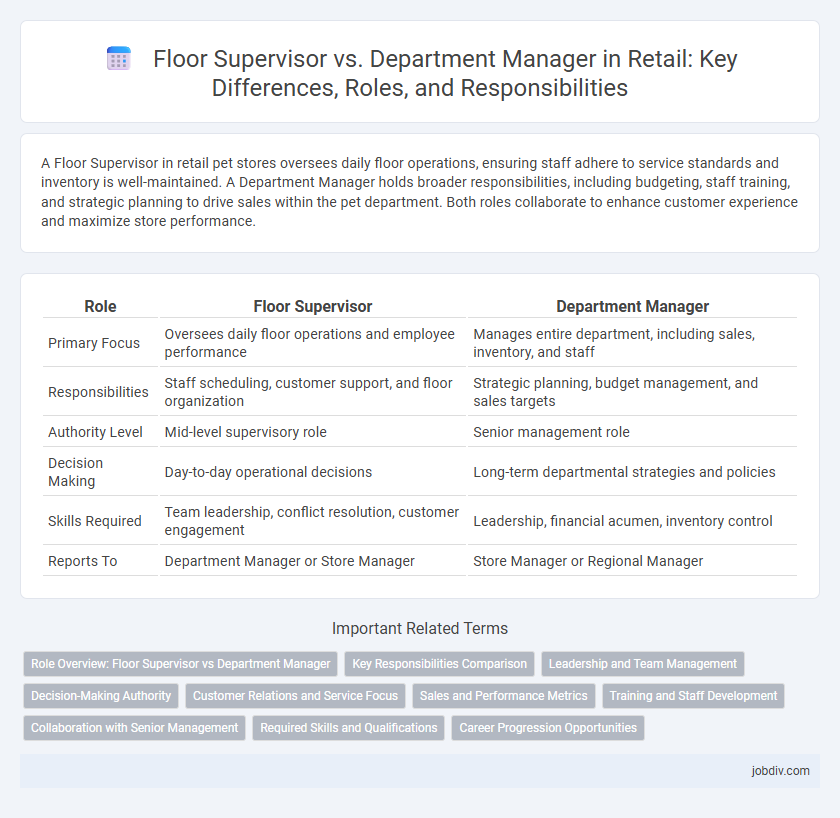A Floor Supervisor in retail pet stores oversees daily floor operations, ensuring staff adhere to service standards and inventory is well-maintained. A Department Manager holds broader responsibilities, including budgeting, staff training, and strategic planning to drive sales within the pet department. Both roles collaborate to enhance customer experience and maximize store performance.
Table of Comparison
| Role | Floor Supervisor | Department Manager |
|---|---|---|
| Primary Focus | Oversees daily floor operations and employee performance | Manages entire department, including sales, inventory, and staff |
| Responsibilities | Staff scheduling, customer support, and floor organization | Strategic planning, budget management, and sales targets |
| Authority Level | Mid-level supervisory role | Senior management role |
| Decision Making | Day-to-day operational decisions | Long-term departmental strategies and policies |
| Skills Required | Team leadership, conflict resolution, customer engagement | Leadership, financial acumen, inventory control |
| Reports To | Department Manager or Store Manager | Store Manager or Regional Manager |
Role Overview: Floor Supervisor vs Department Manager
A Floor Supervisor primarily oversees daily store operations, managing staff workflow, customer service, and merchandise presentation on the sales floor to ensure a smooth retail environment. A Department Manager holds broader responsibilities, including inventory control, sales performance analysis, staff training, and strategic planning within a specific department to meet overall business objectives. The Department Manager typically reports on financial results and coordinates with senior management, whereas the Floor Supervisor focuses on immediate operational efficiency and team coordination.
Key Responsibilities Comparison
Floor Supervisors oversee daily store operations, manage staff schedules, and ensure excellent customer service on the sales floor. Department Managers handle inventory control, plan merchandising strategies, and analyze sales data to boost department performance. Both roles require leadership skills, but Department Managers focus more on strategic planning while Floor Supervisors emphasize real-time operational management.
Leadership and Team Management
Floor Supervisors prioritize direct team oversight and ensure smooth daily operations by managing staff schedules and resolving customer issues. Department Managers focus on strategic leadership, developing team goals, driving sales performance, and managing budgets within their departments. Both roles require strong communication and conflict resolution skills, but Department Managers hold greater responsibility for long-term team development and operational success.
Decision-Making Authority
A Floor Supervisor in retail typically handles day-to-day operational decisions such as staff scheduling and customer service issues, ensuring smooth workflow on the sales floor. Department Managers possess broader decision-making authority, including budget management, inventory control, and strategic planning for their department's performance. The distinction in authority levels impacts how retail operations delegate responsibility and maintain efficiency across various store functions.
Customer Relations and Service Focus
Floor Supervisors directly oversee customer interactions on the sales floor, ensuring immediate service quality and resolving issues promptly to maintain high satisfaction levels. Department Managers strategize department-wide customer service policies, analyze feedback data, and implement training programs to enhance overall customer experience. Both roles prioritize customer relations, but Floor Supervisors emphasize real-time problem-solving, while Department Managers focus on long-term service improvements.
Sales and Performance Metrics
Floor supervisors directly oversee daily sales activities and ensure staff adhere to customer service standards, driving immediate performance on the retail floor. Department managers analyze broader sales performance metrics, develop strategic plans to increase profitability, and manage inventory turnover within their department. Both roles collaborate to optimize sales targets, but department managers focus on long-term growth while floor supervisors prioritize real-time operational efficiency.
Training and Staff Development
Floor Supervisors primarily concentrate on frontline training and coaching, ensuring staff proficiency in customer service and daily operations. Department Managers oversee comprehensive staff development strategies, including performance evaluations, career progression plans, and advanced training programs aligned with organizational goals. Their collaborative efforts drive employee skill enhancement and operational efficiency in retail environments.
Collaboration with Senior Management
Floor Supervisors collaborate closely with senior management to ensure daily operations align with strategic goals, facilitating smooth communication between staff and executives. Department Managers engage more deeply in strategic planning and performance analysis, providing senior management with detailed reports and feedback to optimize department efficiency. Both roles require proactive teamwork to implement corporate initiatives and drive sales growth effectively within the retail environment.
Required Skills and Qualifications
Floor Supervisors require strong interpersonal skills, effective communication, and the ability to manage customer interactions and staff on the sales floor. Department Managers need advanced leadership abilities, strategic planning expertise, and in-depth knowledge of inventory management and sales analysis. Both roles demand experience in retail operations but the Department Manager typically requires a higher level of decision-making and organizational skills.
Career Progression Opportunities
Floor Supervisors typically manage daily store operations and direct sales associates, gaining hands-on leadership experience essential for advancement. Department Managers oversee specific product categories or sections, developing strategic skills in inventory management, merchandising, and team coordination crucial for higher management roles. Progression from Floor Supervisor to Department Manager often enhances career opportunities by broadening responsibilities and demonstrating capacity for operational planning and team leadership within retail hierarchies.
Floor Supervisor vs Department Manager Infographic

 jobdiv.com
jobdiv.com